Why I am returning to my regular dose of Prozac after 2 years of tapering off.
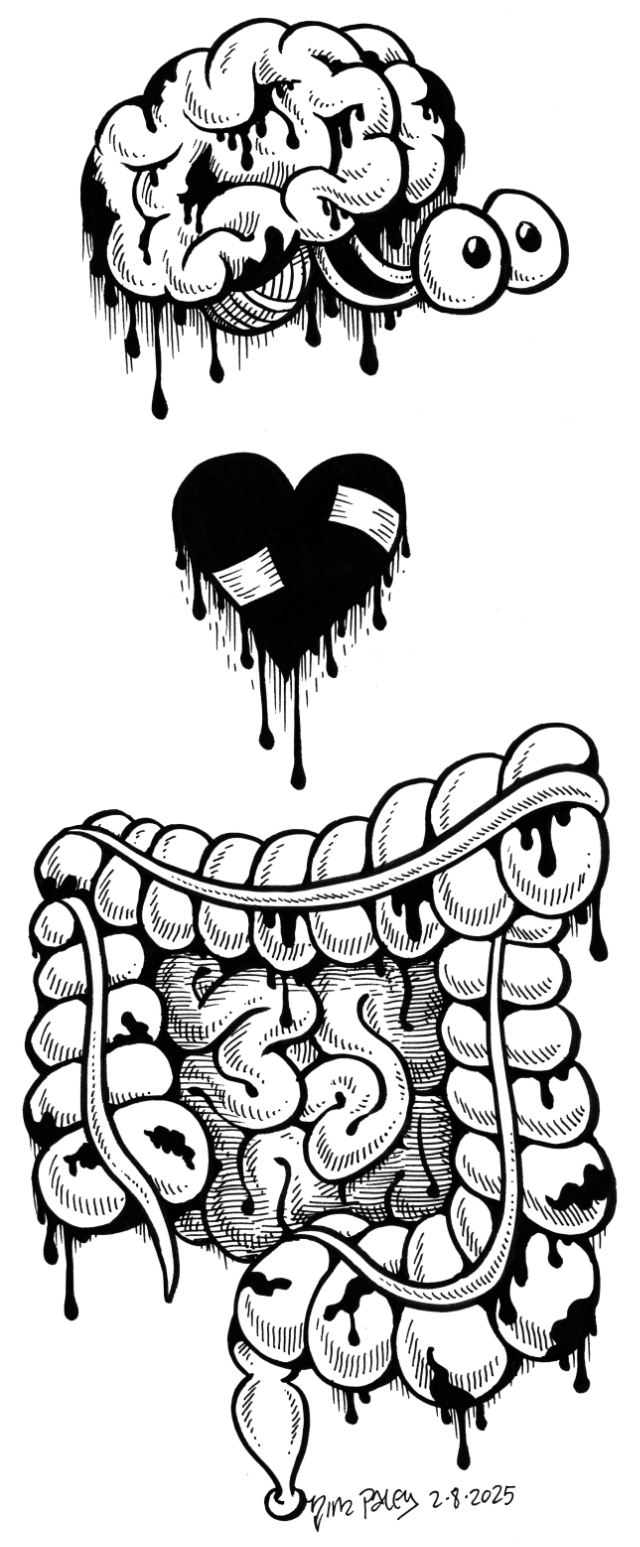
A few days ago, at a candy store in another town, I asked if I could buy some empty chocolate boxes. The co-owner came out and said no, “we’re a candy store, we want you to buy candy not boxes.” I gave her the 4 homemade saffron-cardamom chocolates I had brought for her — she tried one right there, saying “ooh, funky!” I assured her I was just needing a few boxes to give away my culinary experiments to friends, not compete, because among other things I had chocolated myself out. She suggested I try Amazon or Michael’s.
Fair enough, but I felt like my heart was ripped open and my world falling apart. I cried inside as I walked back to my velomobile. I shattered. I wanted something, was told no, and internally was having a breakdown.
Intellectually I knew nothing bad had happened. I even patted myself on the head for giving her those chocolates — I am a thoughtful generous lady, that was nice of me, even though I didn’t get what I wanted — but oh god, inside I wanted to die. Fortunately I had many miles to bike home, something to do instead of cry, although I have cried plenty on rides too, especially these last 2 months. I pedaled home feeling horrific emotional pain, the Existential Grief-Hole. Simultaneously I marveled at my vulnerability, wondering why I now seemed to have regressed to an emotional 2-year-old, an infant, in spite of a good, healthy, brain-cleaning bike ride.
About 15 miles from home I stopped to drink some water and take a few pictures when I heard a woman’s voice: “What is that?” The owner of a nearby country house walked toward me, friendly and curious about my velomobile. I offered her a ride but although she wanted to get in, she determined she might injure herself getting out. She explained she’d had open heart surgery 9 years ago. “This is all held together with zip-ties,” she said, pointing at the center of her chest. She asked if I needed to use a bathroom or anything and invited me in. It was the kind of country stranger interaction I long for, friendly and trusting. She excitedly told her husband about the weird contraption outside and invited him to admire it while I used the toilet. As I prepared to leave she asked, “What do you do?” “I’m an artist.” This led quickly to my mentioning I had been cancelled. “Why?” “Because I said men can’t literally become women.” “Amen!” she responded, and we talked about Trump’s executive orders and our respective liberal friends and family freaking out. “They need our help,” she said. It was lovely.
I rode the rest of the way home marveling at my emotional volatility, comparing how nice that interaction felt, to wanting to die only an hour earlier.
Once home, I called back Susan, thus setting off a series of social gaffes and mistakes I can’t enumerate here. I called Cori to ask whether he was visiting Tuesday or Wednesday — he’d texted me his car is being repaired Tuesday so I thought that meant he’d delay until Wednesday. I was wrong, so I’d need to call back Susan yet again and say no, you can’t use the guest room after all; also I can’t have dinner Tuesday. Meanwhile Louise was texting me, upset that I’d invited Susan to Koffee Klatch, HER carefully curated Koffee Klatch of proper ladies she likes, not Susan, she doesn’t care for Susan’s company. And I said to Cori, fuck everything, I want to die. I said I was too tender to manage life, and to my surprise he said, without sarcasm, “you are.”
“I’ve known you several years now and I haven’t seen you like this,” he said.
So I told him about Prozac, my long history of it, my last two years tapering off slowly, slowly, slower than I’ve ever tapered off before. Skipping one 20mg capsule every 7 days for a month. Then one every 6 days for a month. Then 5, then 4. Pausing for months at a time, especially over last winter when I was dealing with a diagnosis of Crohn’s disease and some occasionally terrifying symptoms. By last Fall I was taking one capsule every other day and feeling fine. At my annual physical my doctor halved my prescription from 20mg to 10mg, and soon I reduced to 2 days on, one day off, effectively 6.66 mg/day. Then December arrived.
First, I saw that fucking movie Flow, which had me crying for a week (it contains numerous scenes of a cat nearly drowning). Then there was the Family Fiasco, that batshit conversation with my brother, leaving me in physical shock. Then my Mom’s punchline the following week, which felt like a real punch. Then Cori’s cat died and we buried him, January 3rd, as grim as an Edward Gorey illustration. Then loneliness and under-stimulation, a vicious cold snap, and the failing of my furnace. Day after day of feeling in myself a great open wound which didn’t heal, does not heal, will not heal, seeps blood forever.
My 12-Step Program didn’t help, and prayer didn’t help. Or maybe they did; I’d probably be worse without them. But still, pain every day, much crying, this Primal Wound. And now finding almost everything hurts.
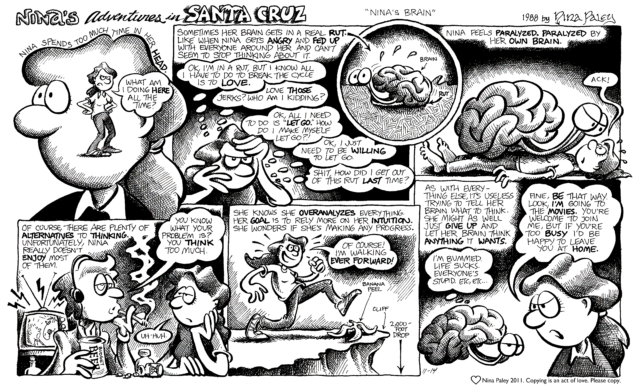
Long ago, my Mom said of my youthful depression: “you have no buffer.” Like my brain needs a layer of fat or lubricant or skin, and it’s just not there. Instead my raw brain is constantly exposed to the sandpaper of Life, and everything hurts.
But not everything; I clearly enjoyed meeting that friendly country woman. If I am treated kindly and get what I want, I’m fine. Problem is, Life isn’t like that. Life is full of negotiations and mistakes. Life is full of Other People with their own wants and needs and mishegas, and some of them — many, perhaps — are at least as sick and wounded as I am.
I’ve been hating my life enough lately to desire travel again, in a futile attempt to get the hell away from myself. I know what would happen if I tried: I would melt down at the airport from whatever inevitable indignity or small altercation arose. Traveling is nonstop negotiation and conflict, constant rubbing up against other people, and without a brain-world barrier I would be reduced to a metaphorical bloody pulp in short order. No buffer, no skin.
I am no stranger to this excruciating state. I was in it for years, from my early teens until I finally got on Prozac at age 20. I am not like normal people. Unmedicated, I can’t do normal people things like watch a sad movie or move through an airport or go to a store. “Nina was born without a pleasure gene,” joked an artist friend in 1987. “But that’s okay, she makes up for it with an extra pain gene.” I suppose my condition is a kind of neurodivergence. I wonder if brain-rawness is a variation of autism.
No one really knows how brains work. “Chemical imbalance” is another way to say, “whatever’s going on here won’t respond to therapy.” Or, “you’re fucked.”
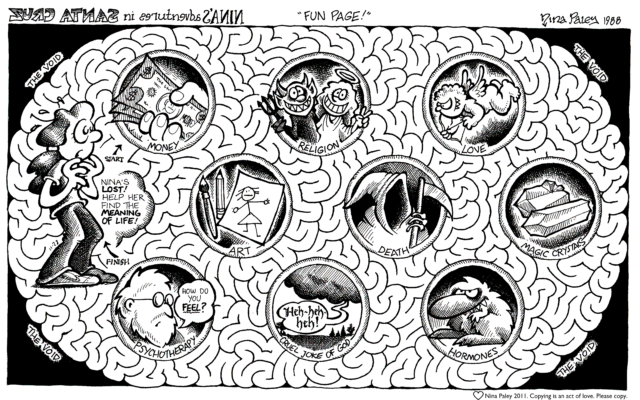
Unlike therapy (which I have done plenty of), Prozac worked. My first months on it, in 1989, were a revelation. After only a few weeks I could be in the world without everything hurting. I still felt bad sometimes, but suddenly I could do something about it. Exercise, which everyone recommended for my “depression” (I don’t think depression is even the right word for my special hell, it’s just the closest I’ve found) became effective once I was on Prozac. Therapy finally made sense. You need a certain baseline of mental/emotional function — let’s say brain function, even though we don’t understand the brain or how SSRI’s really work — for therapy. Once I achieved that baseline, I was off like a rocket.
I suffered no negative side effects that I’m aware of. I remained creative — more creative, because I grew more functional and active. I stayed horny as ever (to my detriment), and orgasmic. I didn’t feel remotely “numb.” I slept better, albeit with vivid dreams for a while.
Over the years I had occasional “breakthrough depressions,” and eventually suffered poop-out (loss of efficacy) and had to switch drugs. Zoloft worked for a while; some years later, Lexapro did not. Every time my SSRI pooped out, I had to find another psychiatrist to prescribe the stuff, on my below-poverty-line, uninsured-artist’s budget, while in the throes of mental breakdown. At those times, not killing myself became my full-time job. Guess I succeeded at that vocation, because I’m still here.
“Acceptance is the answer to all my problems today…” So saieth the Big Book of Alcoholics Anonymous, the Bible of the closest thing to a church I have. But for me, today, acceptance is not the answer. Drugs are. Specifically, Prozac. No amount of acceptance, prayer, slogans, spiritual practice, meditation, meetings, outreach calls, literature, etc., can solve my fundamental problem today, which is brain lesions (according to the model that depression is “inflammation” and allegedly real lesions develop in its sufferers) or “neurodiversity” or “chemical imbalance.” Something physical, in other words, which I hate.
Physical diagnoses sit uneasily with me because they may not be true. A drug seems to effectively treat my depression; physical cure therefore implies physical problem. But drugs can mask and manage all kinds of spiritual, psychological, and mental maladies. Just because a treatment is chemical, doesn’t meant mean the disease is.
I also hate how diagnoses of “chemical imbalance” leave everyone else off the hook*, especially families. A family scapegoats one member, who becomes the Identified Patient, and now it’s all because of a “chemical imbalance.” The scapegoat was just Born That Way, the rest of the family has nothing to do with it except to be supportive of medical treatment, the poor dear. This dynamic is played out by “trans kids” — you can see it in the “I Am Jazz” TV show as insightfully analyzed by Exulansic. A newer variation on “chemical imbalance” is “born in the wrong body,” a physical condition allegedly unrelated to batshit abusive family systems, or trauma.
Even if childhood trauma resulted in a physical brain condition, it’s mine alone to deal with now. I resent that in taking Prozac to treat it, I reinforce a model that lets families, schools, and society at large keep scapegoating children into medical patients.
On the other hand, if my condition was caused by trauma (and I’ll never know, will I? Probably it’s some combination of congenital propensity plus events that wouldn’t have traumatized someone less vulnerable) I shouldn’t begrudge those who initiated my wounds. I could have been hit by a tree in childhood, or been injured in a storm or a fire or other “act of God.” We don’t hold trees, storms and fires forever accountable, expecting them to apologize or change their ways. I know that social contagions, cult-like behaviors, ganging up on the vulnerable, and scapegoating are part of human nature. I know humans, families, schools, and societies know not what they do, just like trees and storms. Some of us get injured early on. While it’s not fair that our wounds, inflicted by other people and powers beyond our control, become our own responsibility for the rest of our lives, it’s also true that Life Isn’t Fair.
In that light I am grateful to have a drug that works so well for me, so accessibly and inexpensively.
***
Going back on Prozac feels like defeat. But surrendering brings with it a certain freedom. Surrendering is Step One:
1. Admitted we were powerless over depression, that our lives had become unmanageable.
2. Upped our dose of Prozac.
3. ?????
4. Profit!
Today (February 4, 2025) will be my third day back on 20mg. 2 days so far. Too early to notice a difference, other than a sense of resignation that permeates everything. I can stop trying now. No more little mind tricks, like affirmations, or thinking of 5 things I’m grateful for RIGHT NOW, it’s EXERCISE dammit, HIT THE FLOOR THINK OF 5 THINGS. HUP! HUP!
I give up, which is a relief.
As I’ve aged, my mental health has become easier to maintain (as long as I’m on my meds). Over time I didn’t need to try to be sane anymore, I just was sane. Sanity didn’t require work anymore. This is the secret of the Elders. My friend Gordon once said that as he aged, “my angst circuits burned out.” I thought that was what happened to me, especially with menopause.
My depressions began in childhood, but sharply escalated with puberty. Menopause was the Light At The End Of The Tunnel in so many ways, why wouldn’t I believe my underlying brain problem might be better too? I was so stable for so long, I assumed I didn’t need Prozac anymore, that I was merely dependent on it. If I tapered off slowly enough, I’d be left with a healthy post-menopausal brain untroubled by the illness of my youth. This latest tapering off has been my first since menopause. I may be excused for thinking it might work.
After more reading on the subject, I’ve determined my symptoms aren’t withdrawal. I tapered off so slowly I didn’t have withdrawal at all. I simply got to where I was before medication. Feeling near-constant pain and wanting to die is my “authentic self.”
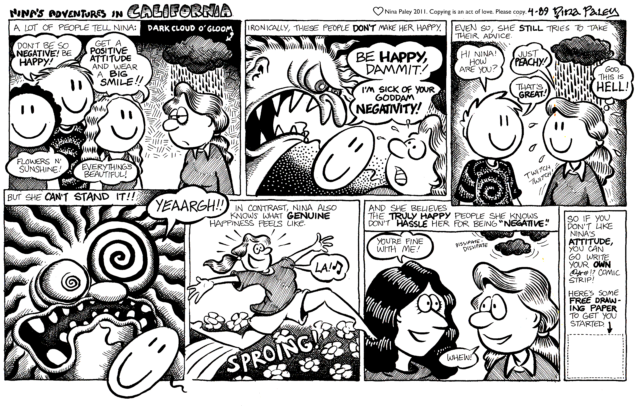
“I’ve known you several years now,” said Cori.
“You’ve known me + Prozac,” I replied. “Maybe you’ve just known Prozac.”
Who am I, without this drug? Am I substantially different, or just malfunctional? If my brain is mental gears grinding against each other and the world, Prozac is lubricant. Like bike grease, it allows parts to move without wearing down or seizing up, or snapping.
Before Prozac I didn’t think I’d live to 30. That was generous; even by 20 I longed for death daily. As a unipolar depressive, I lacked the gumption to do anything about it. But 10 more years of the hell I’d already endured by 20…no way. I was a smart girl, I would have figured something out. Maybe I would have been institutionalized; I certainly wanted to be. I would have eagerly undergone electroshock therapy had it been offered. I read up on it. If lobotomy had been available, I would have considered it. I was desperate.
As an older adult, I chalked all that desperation up to puberty and young adulthood, a difficult time for anyone. What a disappointment to find I’m still like that under all the Prozac. The “real me” is a basket case who literally can’t handle Life.
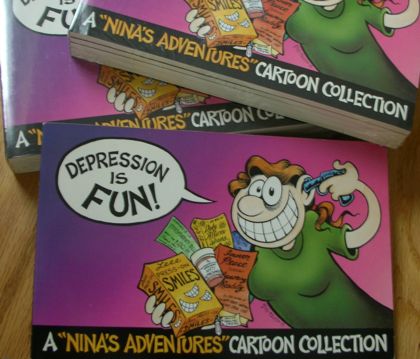
I haven’t had fun in months. I pray for fun. Not like how I draw for fun, or play Scrabble for fun. Praying is not fun. I literally ask God for fun. It is not forthcoming.
I miss play. I desperately long to play with intellectual equals, who are thin on the ground where I live. But what if someone agreed to play with me? What if I got some fun job or gig, the 56-year-old canceled-artist equivalent of a game of catch between 5-year-olds? We’d toss the ball back and forth, and the moment I dropped it, I’d cry. If the ball rolled under a fence I’d have a meltdown. All internally; I have enough adult armor to hide my emotions temporarily. But inside, I’d experience every mistake and failure like a searing hot brand, a punch in my gut, a severe beating, excoriation.
Play and fun require risk. The emotional consequences of small failures are unbearable in my current state. I’m the kid who has a meltdown at seemingly nothing and has to be taken off the playground. Weird kid. The other kids learn not to play with that one.
I say I’m lonely, and I am, but interacting with others is excruciating. My self feels like an open wound, and while I crave the salve of company, most company feels like salt. Better to avoid stimulation and put bandages and pillows between myself and the world. My brain lacks padding, so I compensate by padding my life. Interacting with people is overstimulating. Leaving the house is overstimulating. Eventually, getting out of bed will be overstimulating. This isn’t a matter of “discomfort.” It’s agony and terror. It’s illness.
I can’t think my way out of it, despite my fine intellect. My emotions go crazy while my intellect observes. I cry and shake and melt down, all while knowing nothing bad is actually happening. “It’s all in your mind,” I know very well.
Having a sick mind troubles me more than external losses. I have grieved much in my life, fully and long, and not suffered as when my brain does what it’s been doing lately. “Depression” is its own thing, and its detachment from reality makes it more horrific. It’s not like being sad because my cat died — that’s the purest kind of grief, and grief the purest pain. My depression, or whatever it is, is just pain for no reason, or almost no reason. It’s like being cut to bloody ribbons by a feather. It’s stupid and I know it, and knowing it helps not at all.
Only Prozac helps. Goddamnit.
Thankfully, all I have to do is up my dose (I hope!) and I can exit hell without dying. Of all the drugs I could be dependent on, Prozac is a great one. It’s literally free now, on my insurance. It’s accessible as hell today, unlike when I first got it in 1989. Back then, it required the frequent oversight of a medical doctor, preferably a psychiatrist. Gatekeeping was intense. Now it’s thrown at patients like peanuts to monkeys in a zoo. It’s hard to not get prescribed an SSRI, doctors love them so.
“No one likes being dependent on a drug!” I complain, as yet another friend assures me Prozac is akin to insulin for a diabetic. Ironically, I am dependent on another drug, Skyrizi, for the Crohn’s disease I developed after Covid in 2023. Skyrizi retails at $25,000 a dose, one injection every 8 weeks. It’s fully covered by my insurance but much, much more complicated than a daily capsule of Fluoxetine. I am dependent on this fancy designer monoclonal antibody, and will be for the rest of my life. Yet Skyrizi doesn’t bother me the way Prozac does (it bothers me its own way*). Maybe because Crohn’s disease is purely physical, and the gut, while poorly understood, is better-understood than the brain. I hate colonoscopies, but at least they are possible; no one can ram a probe up my skull and take photos of my neurons. I have pictures of the lesions in my gut; with my brain I just have symptoms. I will never know what’s really going on in there. No one will.
Likewise, I will never know if this winter, this season of grief, is what brought me to my knees and broke my brain. I’ll never know if I just held on until spring, until summer, maybe I’d get better on my own. My current symptoms are so very, very familiar, and I am so tired, I am ending my tapering-off experiment. I’d rather never know if it’s seasonal, than continue as a raw bloody skin-less stump of pain in the indifferent world. I’d rather never know…But I do know. I know what this is. I know why I’ve been on one SSRI or another for 36 years, despite multiple attempts to go off.
I know.
And I hate it.
I look forward to forgetting what this feels like again. I look forward to Prozac working so well I try to go off it again, like an idiot.
I also look forward to death, because after only 2 days the 20mg dose hasn’t kicked in yet. But in a week or two, I should be back to my old inauthentic self. The one that can live outside an institution and look to all the world and herself like a functional human being. The one I’ve been for 36 years, minus a year or two of “breakthrough depression” — certainly more than half my life. The one who doesn’t want to die.
See you on the other side.
P.S.: To everyone about to suggest I change my diet (again), or do yoga, or take this supplement, or do this meditation, or try this therapy, or join this cult: a preemptive fuck you to you all. Seriously, go fuck yourselves. You’re welcome.
*What I hate most about the “chemical imbalance”/physical condition theory is it leaves me off the hook. Being unable to control my mood, mind, and feelings is like having public diarrhea. I actually have the same problem with Crohn’s disease, despite knowing better. I should be able to control this. I can’t. I hate that.

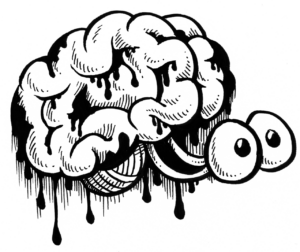
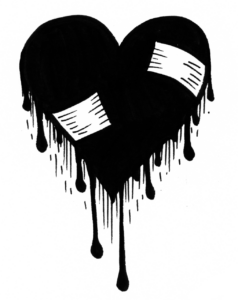
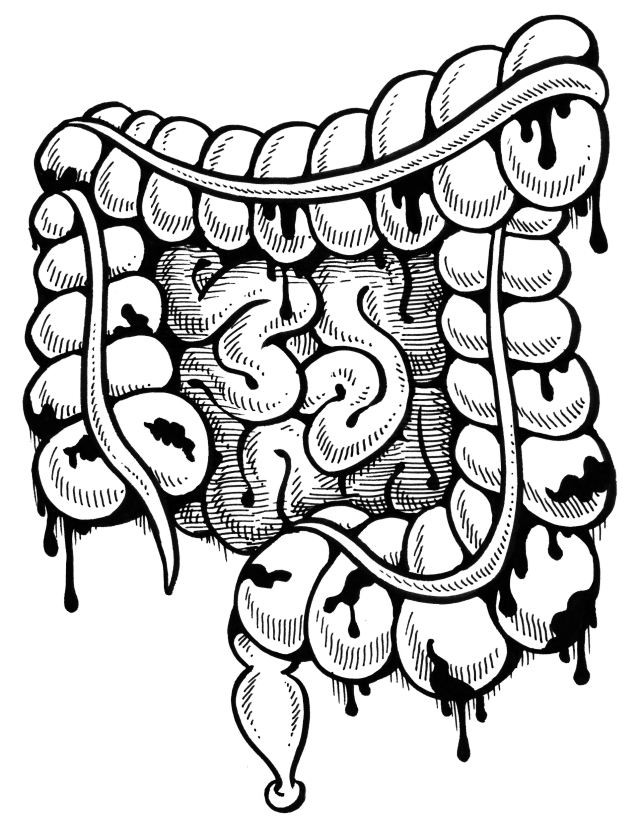
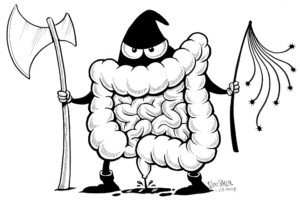
You have a medical condition that requires medication. There’s no shame in that, and you haven’t somehow failed. Please don’t see this as a defeat; on the contrary, you are winning by being able to recognize what you need in order to be healthy and taking that step. Best wishes to you in your continuing journey.
When I prescribe Prozac for anxiety, I often say it’s like wrapping yourself in a fluffy blanket. The world is still throwing small rocks at you, you just can’t feel them as much. I thought of that metaphor when I read your essay.
Been on the Prozac ride myself and even at 60 MG it doesn’t seem be enough, but I also had all the real trauma growing up and years of self induced destruction at 63 I feel like a cracked egg ready to spill out on the world, left the work world as I started to notice that I would walk into a corner without realizing it and stay there, I don’t have any answers and don’t believe it will change, but I’m okay with that, there are people actually trying to figure this all out, I don’t see it happening in my time-line but it will definitely be helpful to many people when we can get a handle on it, for now, live within those self imposed limitations keeping you safe if not sane, take care Nina, peace and strength
I am so sorry. It sucks.
The part where you discussed the role of trauma and family dynamics really resonated with me. I sometimes feel like one of the roles of parents is to build an emotional skeleton in their children, and when they don’t do it properly, one needs to find some other way to maintain emotional stability. You can strengthen your emotional “muscles” by developing different skills, but there is only so much they can do when the skeleton hasn’t developed properly. Maybe you can think of Prozac as a cast, or crutches – some external aid that helps you with your stability. It doesn’t mean it’s not you.
I hope you feel better soon.
I have read and enjoyed your comics since the eighties. During my student days in Salinas, an employee at Salinas High School would loan me copies of the Santa Cruz Comic News. I left Salinas and went to school in San Francisco, where I would see your books at Green Apple Books. My copy of your book is somewhere safe (along with my yearbooks, bibles, and other things in a box/boxes I have not located).
Your unique, brilliant art always inspires.
????
You are a great inspiration- in that you are human and expressive. Two of my five children are on medications for depression and seeing things that ‘aren’t there,’ and what does that say about me as a parent? Probably something I can’t live with so no one says it. All of my children are artists of one kind or another, as am I and their father, and as were my parents, and my sister- the unmedicated one. I am less depressed now that I am older, and fatter. And post menopausal. Being sensitive to responses and the world around you is a good thing if you can handle it- it is aliveness, it is vital. It’s probably powering your work and your beauty as a person. Personally I am only interested in people who are not neurotypical- they are rich in essential qualities, but being one is as risky as free soloing. You are living proof. Was watching an old video or two on YouTube of Faith and John Hubley- did you get inspiration from their work? https://youtu.be/kxtg4M7dmTs?si=6NiEncqc8tvvDqly